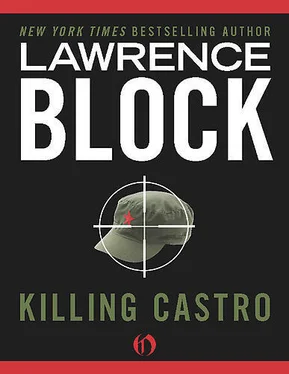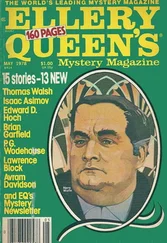He was halfway to the door when the bomb went off.
The noise was tremendous. Garrison wheeled around, ran to the window. He raised the shade and stared out.
Castro was dead. That was the first thing he saw—Fidel Castro, his legs blown away, his blood flowing freely. Castro, sprawling legless across the nearly demolished speakers’ platform. Other men, near him, screaming, wounded, dying.
Then Garrison looked for the bomber. The whole crowd was in a turmoil, women shrieking, children crying, men shouting. Police officers fired their guns into the air. A riot seemed imminent.
And then Garrison spotted the one who’d thrown the bomb. It was a kid, he saw, a young kid hardly old enough to shave. And then he recognized the kid. It was Hines, one of the four others from Hiraldo’s confab in Tampa. Hines had done it—Hines had thrown the bomb and killed Castro.
Now Garrison stood watching Hines pay the penalty.
It was an awful penalty. The crowd mobbed the boy, grabbing at him, kicking at him. Garrison looked on in silence as the crowd beat Hines to death before his eyes. By the time the police forced their way through the crowd, Hines was dead. He lay on the ground. Broken, dead.
Garrison sat for a moment. He smoked a cigarette, ground it out in an ashtray. Then he left the room and the hotel.
The money was waiting for him in Miami. But he knew instinctively that it was money he would never touch. He had done nothing to earn it. Whatever fraction of the hundred thousand was his, he didn’t need it. He would manage on what he had of his own.
He waded through the turmoil around the hotel, fought his way through the screaming, anguished crowd. Three blocks away, he found a taxi and told the driver to take him to the airport.
Would Estrella be there? Would she have heard the news and fled, to whatever dim corner of the city she called her home? Or would she loyally be waiting for him, nervousness showing in her eyes, attracting the attention of airport officials around her?
Were any flights even going to be permitted, or would all planes now be grounded, all would-be passengers scrutinized by armed police officers, subjected to interrogation at any sign of anxiety or hint of guilty knowledge?
The airport building loomed in the taxi windshield.
Garrison had never been nervous before, on any of his jobs. He’d killed many men, and his hands had never shaken, before or after. Now he’d done nothing, killed no one—but he felt his palms sweating.
Estrella would be there, he told himself.
She would be there, and he would take her away with him.
He opened the door.
A NEW AFTERWORD BY THE AUTHOR
In February or March of 1961 my then-wife and I were living in a spacious apartment in a luxury building with Central Park across the street and a slum on our other three sides. She was more than slightly pregnant, and I was too young to worry much about the upcoming obligations of fatherhood. I was writing, and selling what I wrote, and there was nothing wrong with that.
One day my agent, Henry Morrison, came to me with an assignment. Charles Heckelmann, an editor at Monarch Books, itself a second-rate paperback house, had a book he wanted written. The title was to be Fidel Castro Assassinated , and that pretty much tells you what he had in mind, but that didn’t keep him from spelling it out. “A group of Americans go to Cuba,” he said, “and their mission is to assassinate Castro, and they do. They pull it off.”
Now he might have gotten the idea from The Day of the Jackal , but that would have required more in the way of precognition than Charlie could bring to the table, as Frederick Forsyth’s novel wouldn’t appear for another ten years. Matter of fact, I believe I know where he got the idea, and the question of precognition, or more specifically the lack thereof, is very much a part of it.
He got the idea the same place he got the one for a quickie biography of Elizabeth Taylor.
Now I was never offered that job, but my good friend Don Westlake was. And Don took it on, did a creditable job of sifting clippings and pasting together something that made Heckelmann happy, and it was published in due course: Elizabeth Taylor: A Fascinating Story of America’s Most Talented Actress and the World’s Most Beautiful Woman , by John B. Allan. Don never used that pen name before or since, nor did he write any other biographies of actresses. And I don’t know that Monarch published any other actress bios, either.
So why did they want this one? Because Ms. Taylor had been ill a lot at the time, and Heckelmann figured there was a good chance she was dying. If she kicked off, well, he wanted to have a book on the stands before the body was cold.
Get the picture? Fidel Castro was neither America’s most talented actress or the world’s most beautiful woman, but he was very much in the news, and there were rumors—well-founded, it would turn out—that some important and well-placed persons were plotting his assassination. Well, by golly, if someone was going to kill Castro, why shouldn’t Monarch make a buck on the deal?
I suppose it was worth a gamble. I got fifteen hundred dollars for the book, and I think Don got about the same for the Taylor opus, and it’s not as though either book required its subject’s death in order to sell a few copies. And if either long shot came in, well, Heckelmann would look like a genius. A ghoulish genius, but a genius all the same.
Ah well. Last I looked, Fidel and Liz were both still alive. Charlie, on the other hand, died a while back.
It was a challenge, writing the book. I didn’t know a whole lot about Cuba, and I was limited to what I could find out at the library because a fifteen hundred dollar advance wasn’t going to send me to Havana to do on-the-ground research. And Heckelmann wanted the book in a hell of a hurry. God knows what he’d heard…
I wrote it quickly enough, and I happen to know that I finished it on March 29, 1961. How do I remember? Well, if I’d forgotten, the dedication would remind me:
This is for AMY JO, who was born yesterday
If I didn’t learn all that much about Cuba, I did learn a little about writing—specifically, about writing action scenes, something with which I’d had little experience. And I guess the book came off OK. Here’s what a very generous Amazon.com reviewer had to say when Hard Case Crime published the book:
Hard Case Crime has done it again, bringing us a 1961 pseudonymous thriller from Lawrence Block. Killing Castro focuses on one member of a ragtag ensemble cast who have accepted a commission to kill Fidel Castro. They begin in Tampa, make their separate ways to Havana and… well… don’t think that later history guarantees that Fidel will make it through the final reel.The narrative is taut, the language pulpy, the plotting perfect. Drenched in booze, cigarette and cigar smoke, beans and rice and sex, the story moves to its satisfying conclusion. Along the way there are interspersed accounts of Fidel’s rise to and abuse of power. And give Block special points for his knowledge of Cuba in general, Havana in particular.The book underscores Block’s persistent and longstanding talent for this sort of writing. He does it now and he could do it then. And, no, hit man Turner in this book is not the prototype for Block’s current hit man, John Keller. He’s his own man and he’s got some dangerous partners. Fidel, watch your back. (Richard B. Schwartz, “Old Reliable,” review of Killing Castro , by Lawrence Block, Amazon.com, February 10, 2009)
I got another very generous review around the same time from an old friend of mine, long active in leftist circles. “You had the right slant on Cuba all along,” she wrote. I did? Well, even a blind sow finds an acorn once in a while.
Читать дальше












